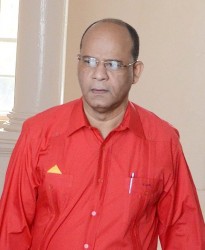PPP executive Clement Rohee says the ruling party paid the price at the last elections for overlooking work on the ground in some areas.
Rohee told a news conference on Monday that this oversight is among the mistakes that the party has been working to correct and that party members will be given the opportunity at its upcoming Congress to weigh in on whether it has addressed the issues and is ready to return to the polls.
“One of them has to do mainly with work on the ground…. Painstaking work. Steady work. Reconnecting with people who had difficulties with, again, localised issues, which we overlooked. Not intentionally but maybe because we were too busy,” he said, when

asked to identify the mistakes the party made.
“So it was mainly the work on the ground. And this is work that we were famous for many, many years ago. This is the type of work that credited the PPP as one of the best organised parties; as a party that has its roots with the people and its connection with the people. Somehow or the other, we overlooked that in some areas. We paid a price for it. We are now working to correct that. We have done work in that respect,” he added.
Rohee’s admission is in line with one of the two prevailing views noted by former PPP member Ralph Ramkarran for what he called the party’s “dismal performance” at the elections.
Writing in a Sunday Stabroek column in May, Ramkarran said one view is that the party’s organisational capacity faltered, lost contact with the people and failed to organise the turnout of voters. The other, he noted, is that support fell off because of failures of the government, including arrogance, extravagance, corruption and loss of support of sugar workers because of the high-handed attitude to them.
Although the PPP/C won the presidency at the November, 2011 elections, it lost control of the 65-seat National Assembly to APNU and the AFC, which hold a combined one-seat majority. In addition, the PPP/C’s last electoral showing represented the first time since 1992 that the party fell below 50% in the vote count. It lost 17,000 votes from 2006, and 44,000 votes from its showing in 2001. In Berbice, which is a key stronghold for the PPP/C, it received almost 10,000 less votes than it did in the last elections.
The party has lost some of its supporters to the AFC, which was co-founded by former PPP MP Khemraj Ramjattan shortly before the 2006 elections. PPP stalwart Moses Nagamootoo joined the AFC shortly before nomination day for the 2011 elections and he waged an intense campaign against the PPP/C leadership, which he accused of corruption and departing from the ideals of founder Dr Cheddi Jagan.
‘We made mistakes’
Rohee on Monday said that “detractors” have manufactured the theory that their accusations against the PPP are responsible for the party no longer being in control of the National Assembly.
However, he admitted that the PPP has suffered “certain setbacks” due to its own mistakes.
“On the contrary, it is our view that we suffered those electoral setbacks because of certain mistakes we made and because of these mistakes we have recognised and we have worked since the elections to correct these mistakes. It has nothing to do with the theory that these persons are spinning—that is, because of these things which they have pointed out that we are where we are today in respect of representation in parliament,” he said.
“We made certain mistakes and in our post-elections analysis we recognised those mistakes.
And we formulated policies on how to address those mistakes. And since then, the party, the Progressive Youth Organisation, [and] the Women’s Progressive Organisation, have worked to implement the decisions that we took to correct those mistakes. So when we go to the congress, we will assess that again and the membership will be given the opportunity to say yay or nay, whether the mistakes we made are being corrected, have been corrected and now we are ready once again to go to the tapes,” he added.
The party’s Congress, which has been twice delayed, will be held from August 2 to 4 at Port Mourant.
Writing on the upcoming Congress, Ramkarran has said it would provide Guyanese the opportunity to assess the future of the PPP, and the government it leads, by the way in which it treats with its electoral defeat of 2011.
“Defying all rational odds and holding on to a minority government, courtesy of the Burnham constitution, the results of the elections signalled the most serious crisis facing the PPP since 1992. With its popular vote slipping from 53 per cent to 48 per cent, the leadership will have to give some account of its stewardship to the party, or lack thereof, which could have resulted in such a dramatic decline in fortunes after so much bluster and bombast over the past ten years and during the election campaign,” he wrote in May.
According to Ramkarran, the Central Committee Report will be forced to analyse the reasons for the loss. However, he has suggested that “the reasons will be anecdotal, would be based on no serious investigation, and would seek to attribute only collective responsibility for the loss.” He said while the party will probably admit some governmental mistakes, it will only be enough to give the report a bit of credibility. “[Former President Bharrat] Jagdeo, who headed the government and on whose head any criticism may fall, is still untouchable. To avoid emphasis on the government’s performance, the major fault will be placed on the failure of the party to mobilize the supporters to vote,” he added.





